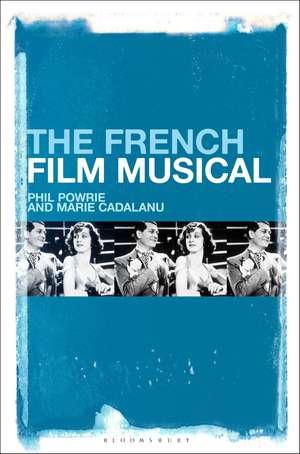The French Film Musical
Autor Phil Powrie, Marie Cadalanuen Limba Engleză Paperback – 22 mar 2023
| Toate formatele și edițiile | Preț | Express |
|---|---|---|
| Paperback (1) | 192.82 lei 43-57 zile | +73.21 lei 6-12 zile |
| Bloomsbury Publishing – 22 mar 2023 | 192.82 lei 43-57 zile | +73.21 lei 6-12 zile |
| Hardback (1) | 716.39 lei 43-57 zile | |
| Bloomsbury Publishing – 16 sep 2020 | 716.39 lei 43-57 zile |
Preț: 192.82 lei
Preț vechi: 250.15 lei
-23% Nou
Puncte Express: 289
Preț estimativ în valută:
36.90€ • 38.62$ • 30.71£
36.90€ • 38.62$ • 30.71£
Carte tipărită la comandă
Livrare economică 31 martie-14 aprilie
Livrare express 22-28 februarie pentru 83.20 lei
Preluare comenzi: 021 569.72.76
Specificații
ISBN-13: 9781501373879
ISBN-10: 1501373870
Pagini: 312
Ilustrații: 80 bw illus
Dimensiuni: 152 x 229 x 28 mm
Greutate: 0.41 kg
Editura: Bloomsbury Publishing
Colecția Bloomsbury Academic
Locul publicării:New York, United States
ISBN-10: 1501373870
Pagini: 312
Ilustrații: 80 bw illus
Dimensiuni: 152 x 229 x 28 mm
Greutate: 0.41 kg
Editura: Bloomsbury Publishing
Colecția Bloomsbury Academic
Locul publicării:New York, United States
Caracteristici
Presents the first work claiming the French film musical as a major film genre, stretching across all decades since the advent of sound
Notă biografică
Phil Powrie is Emeritus Professor of Cinema Studies at the University of Surrey, UK. He is Chair of the British Association for Film, Television and Screen Studies and Chief General Editor of Studies in French Cinema.Marie Cadalanu is an independent researcher working as a teacher in a lycée in the Paris, France area.
Cuprins
1. Introduction2. Multi-language Versions3. The French Operetta4. Pills and Tabet and the Marseille Operetta5. Fréhel and Édith Piaf6. Josephine Baker and Charles Trenet7. The Classical Music Film8. The Big Band Film9. The Musical Sketch Film10. Tino Rossi11. George Guétary and Luis Mariano12. D'où viens-tu Johnny? and the Transition to the Modern Musical13. Jacques Demy and the New Wave14. The Opera Film and the Modern Classical Music Film15. The Modern Musical16. Nostalgia17. ConclusionFilmographyReferencesIndex
Recenzii
Phil Powrie and Marie Cadalanu's book categorically disproves the cliché about French cinema having no musical tradition, with the one exception of Jacques Demy. In this ground-breaking volume, the authors reveal the extraordinary wealth and diversity of the musical tradition in French cinema since the coming of sound. Encompassing popular and auteur film, they demonstrate that, if there is not one 'musical genre' in France, there are myriad ways in which French film interacts with a wide range of cultural traditions, from cabaret, music-hall, chanson réaliste, operetta and opera to jazz bands and pop music, in an unbroken line from René Clair to François Ozon and Christophe Honoré, via Josephine Baker, Charles Trenet, Edith Piaf and Johnny Hallyday.
Powrie and Cadalanu excavate the vibrant and varied tradition of the French film musical from the early sound musicals of René Clair to the recent nostalgia-inflected revival of the form. The authors illuminate the genre's iconic performers, Edith Piaf and Josephine Baker, but weave fresh figures into the story, notably fou chantant Charles Trenet, crooners Tino Rossi, Luis Mariano, and Georges Guétary, and big band powerhouse Ray Ventura and his Orchestra. Especially welcome is the information on the French film musical's production contexts from the 1930s through the 1950s, when the genre embraced jazz, big band, and operetta. The authors rightly identify the musicals of Jacques Demy as a turning point from popular to auteur-inflected work and provide welcome attention to the musicals of Godard, Varda, Akerman, and Resnais. Wisely avoiding the argument that the French film musical died with the birth of yéyé and youth culture, the authors instead reveal the never-ending transformation of the genre, emphasizing its nostalgia for community and its productive recycling of earlier forms of entertainment.
Powrie and Cadalanu excavate the vibrant and varied tradition of the French film musical from the early sound musicals of René Clair to the recent nostalgia-inflected revival of the form. The authors illuminate the genre's iconic performers, Edith Piaf and Josephine Baker, but weave fresh figures into the story, notably fou chantant Charles Trenet, crooners Tino Rossi, Luis Mariano, and Georges Guétary, and big band powerhouse Ray Ventura and his Orchestra. Especially welcome is the information on the French film musical's production contexts from the 1930s through the 1950s, when the genre embraced jazz, big band, and operetta. The authors rightly identify the musicals of Jacques Demy as a turning point from popular to auteur-inflected work and provide welcome attention to the musicals of Godard, Varda, Akerman, and Resnais. Wisely avoiding the argument that the French film musical died with the birth of yéyé and youth culture, the authors instead reveal the never-ending transformation of the genre, emphasizing its nostalgia for community and its productive recycling of earlier forms of entertainment.
